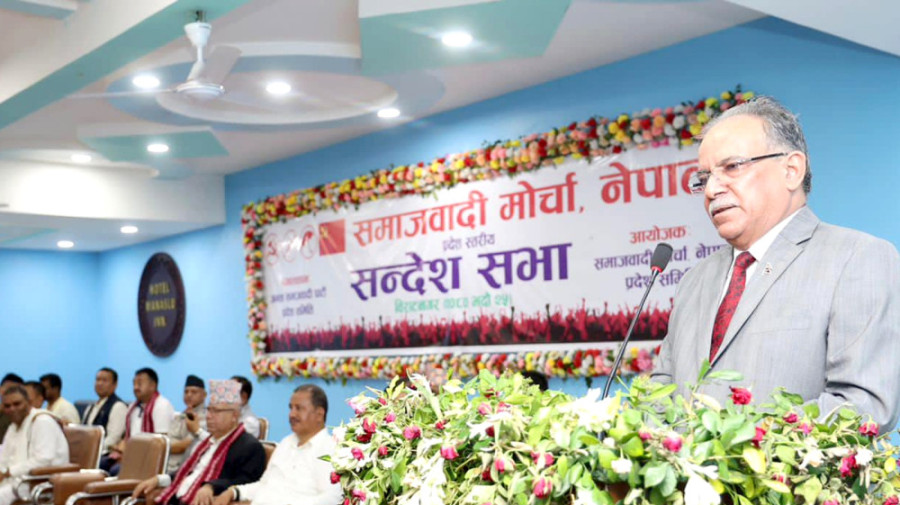Politics
Socialist Front wants Koshi name changed
Prime Minister Pushpa Kamal Dahal draws flak for encouraging street protests.
Tika R Pradhan
Leaders of the Socialist Front Nepal, which comprises four parties including Prime Minister Pushpa Kamal Dahal-led CPN (Maoist Centre) and two other ruling parties, have said they want the name of the Koshi Province changed to reflect its ethnic identity.
Leaders of the front speaking at a gathering said they would gradually become a unified party.
Although three major parties–the CPN-UML, Nepali Congress and CPN (Maoist Centre)–had endorsed the name Koshi with a two-thirds majority in the provincial assembly on March 1, the ruling CPN (Maoist Centre) has now reversed its stance following strong protests from indigenous groups of the province.
“Now our party has a clear position on the issue. The name should be changed,” said Hitraj Pande, chief whip of the CPN (Maoist Centre).
On Monday, the Socialist Front organised a rally in Biratnagar, but the province’s name ‘Koshi’ was conspicuously missing on the rally-related posters, banners and publicity materials.
The province saw months of unrest by indigenous nationalities after the provincial assembly endorsed the name Koshi.
Addressing the mass gathering at Biratnagar, Prime Minister Dahal, however, said the ongoing conflict over the name of the province should be resolved through dialogue. “We should seek a solution through talks and dialogues respecting the people's opinion and not through confrontations,” said the prime minister. He said if the agitators choose confrontations then reactionary forces could benefit from the situation.
The prime minister came down heavily against those attacking the parties and their leaders on social media saying they should be dealt with using a ‘tit-for-tat’ approach.
“I can’t watch [such social media content]. The pictures are disturbing. They [those posting such content] are agents of dictatorship. Attacking democratic leaders with a khukuri? Now, we should take a tit-for-tat approach,” the prime minister said at the gathering. “We should show them that we are still alive by bringing hundreds of thousands of people to the streets.”
On September 6, Nepali Congress Joint General Secretary Mahendra Yadav was violently attacked at Bhrikutimandap in Kathmandu by Shyam Sapkota of Nuwakot with a khukuri. Yadav was attacked while exiting the premises of the Reporters Club.
Nepali Congress leader and publicity department head Min Bishwakarma, however, said it was unbecoming of the prime minister to make inciting and irresponsible statements. “It was not advisable on the part of the head of the government to make such inciting statements which could make people emotional and create confusion,” said Bishwakarma. “It’s also not good for the mayor to say he would set fire to Singha Durbar either.”
The prime minister, however, said he was in an unarmed political war and needed the support of the people. By the term ‘political war’, the prime minister was alluding to his attempts to bring reforms by curbing corruption and making government services more accessible in order to address the growing frustrations and attacks directed at politicians and parties.
He also said the front will come up with a plan for street demonstrations once the ongoing mass meetings conclude after the final one scheduled for the Sudur Paschim province.
Political analysts, leaders and observers, meanwhile expressed shock at the prime minister’s statements saying it was ‘a strange development’ for the executive head of the country to encourage people to take to the streets.’
But leaders close to the prime minister and the ruling parties defend the prime minister saying that he was telling the truth as some elements that want to revert the political change in the country have started to attack leaders who have fought hard for the democratic system.
Pande, the Maoist Centre leader, said the prime minister made such a statement because he became emotional after the violent attack on the Nepali Congress leader and his utterance should not be interpreted otherwise.
Some political analysts said the executive head should carefully consider the possible consequences of his words on the general public before speaking.
“Maybe he spoke as a party leader. It would be better if he had refrained from using such language. He should differentiate what he says as the executive head and as a party leader,” said Tula Narayan Shah, a political analyst. “He has fallen into controversy in the past as well.”
Referring to the bad attitudes and practices of the parties and the leaders as ‘garbage’, the prime minister even went on to say that the garbage collected over centuries cannot be removed within a few years.




 11.12°C Kathmandu
11.12°C Kathmandu















